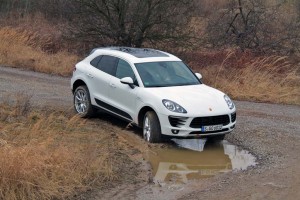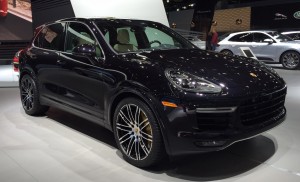
Porsche is recalling nearly 60,000 Cayenne and Macan diesel-powered sport-utility vehicles to fix a emissions control issue.
German authorities ordered Porsche to recall almost 60,000 diesel-powered sport utility vehicles in Europe after it was discovered thy found software that manipulates emissions controls to help defeat tests.
The German transport ministry found the software, which could reduce emissions controls for nitrogen oxide, during inspections of Macan and Cayenne SUVs. Parent company Volkswagen has had thousands of vehicles recalled for similar issues with VW and Audi diesels since 2015.
The recall covers 52,831 Macan 3.0-liter V6 and 6,755 Cayenne 4.2-liter V8 vehicles. Porsche’s not the only VW brand with a diesel problem right now as Audi recently suspended deliveries of the current A6 and A7 models.
Porsche’s SUVs are powered by diesel engines supplied by Audi. The company told German regulators about “irregularities” it found in emission tests in February. Audi started tests in July on some 850,000 cars, according to Reuters.
(Porsche adds to 911 GT3 family with less. Click Here for the story.)

The Porsche Macan helped drive big profits for the brand, but is subject to another diesel-related recall.
In the statement Porsche reiterated it takes full responsibility toward affected customers, who will be contacted by dealers after engine fix has been approved by the regulator.
“Independently from the technical solution Porsche continues to conduct internal tests on its vehicles and makes optimizations” based on its findings, the company said. Porsche said it continues to work closely with the relevant authorities.
(Click Here for a first look at the Porsche Mission E Cross Turismo.)
Porsche recalled 21,600 Cayenne’s last July. The sport-utilities had 3.0-liter V6 diesels that also featured “irregularities.” The automaker and German regulators worked on a software resolution to the problem, which was approved last fall.
According to Bloomberg News, Porsche reiterated it takes full responsibility toward affected customers, who will be contacted by dealers after engine fix has been approved by the regulator.
(Click Here for more on Porsche’s plans for a super-fast charging system to support its Mission E launch.)
“Independently from the technical solution Porsche continues to conduct internal tests on its vehicles and makes optimizations” based on its findings, the company said in a statement. Porsche said it continues to work closely with the relevant authorities.

